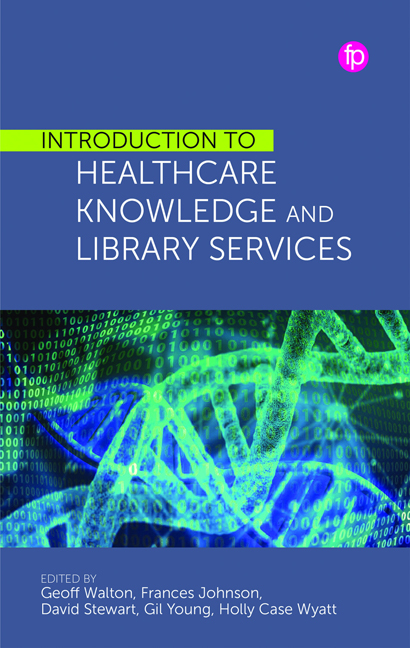Book contents
- Frontmatter
- Contents
- Figures, Tables and Case Studies
- Notes on Contributors
- Foreword
- How to Use this Book
- 1 An Introduction to Healthcare Knowledge and Library Services
- 2 Strategic Development for Healthcare Knowledge and Library Services
- 3 Exploring the Training and Development Needs of the Healthcare Knowledge and Library Services Workforce: A Case Study
- 4 Advocacy and How Knowledge and Library Specialists Tailor Services to Meet the Needs of Their Stakeholders
- 5 Mobilising Evidence and Knowledge
- 6 Internal and External Partnerships
- 7 Health Literacy, Patient Information and Combating Misinformation
- 8 Resource Discovery and Open Access
- 9 Growing the Evidence Base in Healthcare Knowledge and Library Services
- 10 Measuring Progress, Value and Impact in NHS Knowledge and Library Services
- 11 Reflective Practice in Healthcare Settings
- 12 Looking to the Future of Healthcare Knowledge Services
- Index
8 - Resource Discovery and Open Access
Published online by Cambridge University Press: 22 February 2024
- Frontmatter
- Contents
- Figures, Tables and Case Studies
- Notes on Contributors
- Foreword
- How to Use this Book
- 1 An Introduction to Healthcare Knowledge and Library Services
- 2 Strategic Development for Healthcare Knowledge and Library Services
- 3 Exploring the Training and Development Needs of the Healthcare Knowledge and Library Services Workforce: A Case Study
- 4 Advocacy and How Knowledge and Library Specialists Tailor Services to Meet the Needs of Their Stakeholders
- 5 Mobilising Evidence and Knowledge
- 6 Internal and External Partnerships
- 7 Health Literacy, Patient Information and Combating Misinformation
- 8 Resource Discovery and Open Access
- 9 Growing the Evidence Base in Healthcare Knowledge and Library Services
- 10 Measuring Progress, Value and Impact in NHS Knowledge and Library Services
- 11 Reflective Practice in Healthcare Settings
- 12 Looking to the Future of Healthcare Knowledge Services
- Index
Summary
Introduction
What do we mean by ‘resource discovery’? Access to up-to-date information is critical for supporting day-to-day decision making in health. To deliver high quality care and support to patients, service users, carers and families, NHS staff need easy access to current and quality knowledge resources. The vision of HEE’s Knowledge for Healthcare strategy is for staff, learners and the public to use the right knowledge, at the right time, in the right place to achieve excellence in healthcare.
We are talking about resources, such as books, journals and databases, as well as the infrastructure, such as library management systems, discovery systems and authentication.
As we’ve learned in other chapters, this is a distributed, mobile workforce comprising busy, time-poor staff: we cannot always reasonably expect them to visit physical libraries to access printed material, so e-resources are a key means to make knowledge available to the health and care workforce.
A key factor influencing resource discovery in the NHS is of course continuous advances in technology and the growing expectations of ‘digitallysavvy’ generations of staff and learners, to some extent countered by the limitations of information technology in the NHS and the need to support all staff, regardless of digital literacy levels.
Historically, NHS libraries were largely funded from medical education budgets and the content held within them was largely aimed at medical staff. However, libraries have become fully multi-disciplinary and now need to meet the needs not only of all types of clinical staff, but anyone that works in the organisation. As such, the resources they provide need to encompass the needs of all these staff groups as well as the students on placement within the organisation.
Open access has become a growing imperative and we conclude this chapter by defining what this means within a healthcare context and the NHS.
Types of resources
Books
Books often provide useful background or introductory information on a topic. Potentially helpful for healthcare staff at different points throughout their careers, they are particularly popular with those on education courses and students on placement in NHS organisations, who will typically have a recommended reading list from their university.
Book records are added to the catalogues of library management systems (LMS).
- Type
- Chapter
- Information
- Introduction to Healthcare Knowledge and Library Services , pp. 125 - 142Publisher: FacetPrint publication year: 2024

